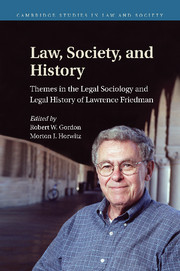Book contents
- Frontmatter
- Contents
- Contributors
- Introduction
- PART I OVERVIEWS AND ASSESSMENTS OF FRIEDMAN'S WORK
- PART II APPLICATIONS OF CONCEPTS, INSIGHTS, AND METHODS IN FRIEDMAN'S WORK
- PART III THE LEGAL PROFESSION
- 10 Friedman on Lawyers
- 11 Legal Culture and the State in Modern Japan
- PART IV LAW AND LARGE AREAS OF SOCIAL LIFE
- PART V FACTS FROM THE UNDERGROUND: DIGGING LEGAL HISTORY OUT OF THE CELLAR
- PART VI PERSPECTIVES FROM OTHER CONCEPTUAL WORLDS
- Index
- Titles in the series
- References
10 - Friedman on Lawyers
A Survey
Published online by Cambridge University Press: 07 October 2011
- Frontmatter
- Contents
- Contributors
- Introduction
- PART I OVERVIEWS AND ASSESSMENTS OF FRIEDMAN'S WORK
- PART II APPLICATIONS OF CONCEPTS, INSIGHTS, AND METHODS IN FRIEDMAN'S WORK
- PART III THE LEGAL PROFESSION
- 10 Friedman on Lawyers
- 11 Legal Culture and the State in Modern Japan
- PART IV LAW AND LARGE AREAS OF SOCIAL LIFE
- PART V FACTS FROM THE UNDERGROUND: DIGGING LEGAL HISTORY OUT OF THE CELLAR
- PART VI PERSPECTIVES FROM OTHER CONCEPTUAL WORLDS
- Index
- Titles in the series
- References
Summary
INTRODUCTION
This chapter is about Lawrence Friedman's writing on lawyers. I am sorry not to have known the 29-year-old who wrote the extremely funny note on lawyers and law reviews in 1959, but I was getting to know the author of The Legal System (LS) when it was published in 1975. Concepts in LS, above all that of legal culture (originally introduced in 1969 in his article, “Legal Culture and Social Development” [LCSD]), continue to inform and provoke discussion. My own research interests have been in lawyers. I have described as a “legal system approach” to the study of lawyers one that asks questions about them that are based on the part they play or may possibly play in forwarding the purposes of the legal system, whether these purposes are seen in normative or sociological terms. LS is still one of the few attempts to provide a general account of legal systems from a social science perspective, and thus it gives us an unusual opportunity to consider this kind of question about lawyers and Friedman's suggested answers. Yet Friedman, the historian and social analyst, has written many other works in which lawyers also appear, some of which I review here to discuss how they fit into or perhaps enrich the points made in LS.
- Type
- Chapter
- Information
- Law, Society, and HistoryThemes in the Legal Sociology and Legal History of Lawrence M. Friedman, pp. 149 - 168Publisher: Cambridge University PressPrint publication year: 2011

